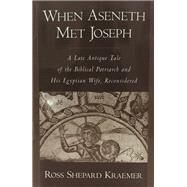When Aseneth Met Joseph A Late Antique Tale of the Biblical Patriarch and His Egyptian Wife, Reconsidered
, by Kraemer, Ross Shepard- ISBN: 9780195114751 | 0195114752
- Cover: Hardcover
- Copyright: 8/6/1998
This is a study of an anonymous ancient work (surviving in shorter and longer versions) conventionally titled Joseph and Aseneth , but here simply designated as Aseneth . Composed in Greek, the text narrates the transformation of the daughter of an Egyptian priest into an acceptable spouse for the biblical Joseph (whose marriage to this woman is given brief notice in Genesis). Relatively unknown outside of scholarly circles, this story is remarkable for its focus on a female character and for its apparent absence of overt misogyny. This unusual tale has traditionally been viewed as a Jewish conversion story composed no later than the second century C.E. Through a detailed examination of the texts, however, Ross Kraemer arrives at conclusions that disagree with previous findings with respect not only to questions of date, provenance, identity, geographic origin, and textual relationships, but also to many matters of interpretation. She argues that the tale is as likely to be Christian as it is to be Jewish. She also contends that it was written at least a quarter of a century later than previously believed. She shows that the tale's account of Aseneth's interactions with an angelic being is heavily influenced by ancient portraits of the magical adjuration of powerful divine beings, including that of the sun god, Helios, and by Neoplatonic ideas about the fate of the souls. Kraemer demonstrates the centrality of ideas about gender in the representation of Aseneth, and goes on to explicate the story's implications, within the context of constructs of and concerns about gender in Late Antiquity.







